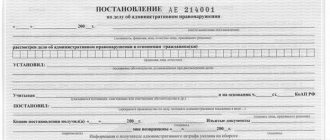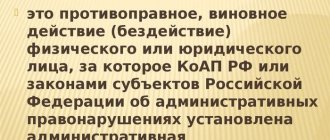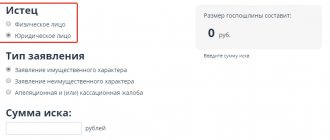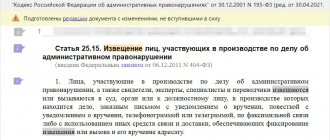Code of Administrative Offenses of the Russian Federation in Art. 30.12 provides the right to participants in an administrative case to protect their rights and defend their interests when appealing, protesting decisions that have entered into legal force in a case of an administrative offense , decisions based on the results of consideration of complaints, protests by filing a cassation appeal.
ATTENTION : our lawyer for administrative cases will not only explain the cassation procedure under the Code of Administrative Offenses of the Russian Federation, but will also draw up a cassation appeal in your case: professionally and on time. Call today!
Who can file a cassation in an administrative case?
The resolution of cases of administrative offenses on the merits is carried out through a complete, comprehensive and objective clarification of the circumstances of the case. Participants in administrative proceedings have the right to file a cassation, namely:
- the person brought to justice and his defense counsel. The Commissioner under the President of the Russian Federation may be admitted as a defense lawyer if an offense has been committed in the field of entrepreneurial activity
- the victim and his representative
- legal representatives of individuals and legal entities
- prosecutor
- the official who made the appealed decision or sent the case to court (if the decision was made by a judge)
Procedure for consideration
After filing a claim with the authority that issued the disputed appeal ruling, a process for assigning a case is formed. Attached copies of the complaint itself and documents are sent to all parties interested in the case.
At this stage, the court decides on organizational issues:
- Checks whether there are grounds to send the complaint to another court in accordance with jurisdiction (in case the complainant made a mistake when choosing a court).
- Resolves the issue of the need to request additional materials from the parties (for example, expert opinions, calling witnesses).
- Examines the complaint to determine whether there are grounds for refusal to consider it (mainly violation of the deadlines allocated for filing and the presence of a corresponding petition to restore the deadlines).
If all rules and forms are met, the court of first instance sends the appeal to a higher court. No more than three days are allocated for this process.
The procedure for consideration is practically no different from the criminal or civil procedure. Using subpoenas, the court summons the parties to a hearing. On the day of the hearing, attendance is checked.
The failure of one party to appear is not a reason for postponing the consideration of the case.
The following steps will take place at the meeting:
- Verification of the credentials of the parties appearing.
- Clarification of rights and responsibilities.
- Announcement of the reason for holding the meeting - consideration of an appeal against the decision of the court of first instance.
- The complainant is informed about the objections of the opposite party, if any.
- The stage of filing petitions from the participants in the case begins.
- Listening to the parties.
- Making a decision and announcing its introductory and operative parts.
If you disagree with the decision of the appellate court, the citizen has the right to prepare and file a cassation appeal.
If the complainant receives objections to the appeal only at the hearing, he may ask the court to adjourn the hearing and provide an opportunity to prepare a response to the objections.
How to draw up a cassation appeal in an administrative case?
When preparing a complaint, a person should take into account the mandatory elements established by Part 2 of Art. 30.14 of the Code of Administrative Offenses of the Russian Federation, as well as the full package of documents specified in Part 3 of this article.
Thus, the complaint contains:
- name of the court to which the complaint is sent
- applicant details
- data of persons participating in the appealed administrative case
- name and date of the appealed decision
- grounds for review and cancellation of the decision
- list of attached documents
IMPORTANT : cassation fees under the Code of Administrative Offenses of the Russian Federation are not subject to state duty, so there is no need to pay it.
The following documents are attached to the complaint:
- a copy of the appealed decision and decisions on other complaints, if it was previously appealed against
- a copy of the applicant’s passport, in the case of sending a complaint by the person involved, or copies of documents confirming the person’s authority to file a cassation
- copies of the complaint itself and its attachments for all participants in the process
- other copies of documents that, at your discretion, may influence the judges when making a decision, if, of course, these documents are in the case (in the case of new evidence, it is necessary to justify to the court the impossibility of providing them earlier when considering the case in lower instances)
After the list of attached documents, the complaint is signed and the date for sending the documents to the court is set.
HEALTHY:
Grounds for cancellation and amendment of judicial acts in cassation
Article 328 of the CAS of the Russian Federation names the grounds for canceling or changing decisions of lower authorities. These include serious errors in the application of standards:
- substantive law;
- procedural law.
Errors that may affect the outcome of the proceedings are considered significant. If they are not corrected, it will not be possible to restore the violated rights of any of the participants.
Verification of judicial acts is limited to the arguments specified in the complaint. If the dispute affects the interests of an indefinite number of persons, then the court has the right to expand the scope of the subject of appeal.
The procedure for filing a cassation appeal in an administrative case
The complaint is submitted directly to the cassation court of general jurisdiction, which is authorized to consider it. Decisions of arbitration courts in administrative cases that have entered into legal force can be considered by the Supreme Court of the Russian Federation only if all other methods of appeal in arbitration courts have been tried.
A package of documents is submitted to the court on purpose or sent remotely. In case of courier delivery, an additional copy of the cassation will be required, on which the court office will make a note about the acceptance of the documents.
Remote cassation can be filed by sending:
- by registered mail
- other courier delivery
- as well as in electronic form, for which you will need to go through a personal identification procedure
Who has the right to file an appeal?
The current legislation provides that if he disagrees with the conclusions of the first instance, which considered the administrative case, the citizen has the right to complain to a higher authority.
An appeal against the decision of the first instance and the arbitration court is filed if you want to challenge:
- correctness of the decision made;
- bringing to administrative responsibility;
- initiation of bankruptcy proceedings;
- return of the statement of claim, etc.
In order for your papers to be accepted, you must meet the following criteria:
- have citizenship of Russia or another country, be an immigrant or a refugee;
- reach adulthood;
- be capable.
Legal capacity refers to a person’s ability to exercise his or her constitutional rights and fulfill the responsibilities imposed by the laws of the country. That is, a person must be fully aware of the actions taken.
In addition to the specified criteria, the person filing the complaint:
- direct participant in an administrative case;
- a person whose rights were violated in administrative proceedings;
- a representative acting legally.
Deadline for filing a cassation appeal in an administrative case
The Code of Administrative Offenses of the Russian Federation does not specify a deadline for filing a cassation. When considering administrative complaints under the CAS of the Russian Federation, the courts pay attention to the period of time that has passed since the date the resolution entered into legal force and the reasons for its late submission to the court.
Most often, the cassation court recognizes the following as valid reasons:
- absence of an appeal procedure in the resolution
- lack of information about delivery of a copy of the decision to the person who filed the complaint
- illness of the person filing the complaint, depriving him of the opportunity to file a cassation earlier
The Code of Administrative Proceedings of the Russian Federation (CAS RF, Part 2, Article 318) determines that judicial acts are subject to appeal in cassation within six months after they entered into legal force . Thus, when preparing a cassation in an administrative case, it is also better to understand under which code the complaint will be filed, ask for the restoration of the deadline if you are guided by the CAS RF, and not the Code of Administrative Offenses of the RF, which does not provide for a deadline.
USEFUL : read the link for more details about restoring the missed deadline for filing a cassation under the Code of Administrative Offenses of the Russian Federation, and also watch a video on the topic
What documents should I attach?
In addition to the text itself, the package contains copies of all additional documents that act as evidence of violation of rights.
Documents can be sent by mail or brought to the body that made the decision yourself. When sent by mail, the letter must contain a notification. When submitting, personally put an acceptance stamp on your copy of the document.
READ Duration of copyright for works published under the name of the author: how many years is copyright valid, from when the work is protected
Documents that were previously submitted to the first instance do not need to be submitted. Copies of the attachments must be prepared for all parties who will be involved in the review.
Consideration of a cassation appeal in an administrative case
The procedure for considering a complaint begins from the day it is accepted for proceedings and the corresponding court ruling is issued. After this, the court notifies the participants in the case about the receipt of this complaint, thereby giving them the opportunity to familiarize themselves with the case materials and file objections.
The proceedings must be completed within two months from the date the documents are received by the court. If the cassation appeals the case for study, then this period will be one month from the date the documents were accepted by the court.
The result of the consideration of the case will be the issuance of a decision:
- about leaving the complaint unsatisfied
- on changing or canceling the appealed act with its return for new consideration
- termination of proceedings
Attention!
The procedure, procedure and deadlines for appealing decisions that have entered into legal force in cases of administrative violations are regulated by Ch. 30 Code of Administrative Offenses (Art. 30.12 - 30.19).
This stage of appeal acts as an alternative to such a stage as appealing decisions that have not entered into legal force, since it does not contain restrictions in the form of establishing a period during which it is possible to appeal a decision that has entered into legal force. Those. a complaint against a decision that has entered into legal force in a case of an administrative offense can be filed after 5-10 years. But with one exception: appealed in the manner regulated by Art. 30.12 of the Code of Administrative Offenses of the Russian Federation, there can only be resolutions and decisions in cases of administrative offenses adopted by the judicial authorities.
Decisions of non-judicial bodies and officials that have entered into legal force cannot be appealed in the specified manner if they have not been appealed to the court.
This circumstance is due primarily to the fact that, within the meaning of Article 126 of the Constitution of the Russian Federation, Articles 19, 19.1 of the Federal Constitutional Law “On the Judicial System of the Russian Federation” and Article 23.2 of the Federal Constitutional Law “On Courts of General Jurisdiction in the Russian Federation”, cassation courts of general jurisdiction and the Supreme Court of the Russian Federation review judicial acts of lower courts. Since the Constitution of the Russian Federation and the aforementioned Federal Constitutional Laws give the courts listed above the powers to control the activities of lower courts, the subject of their review can only be acts adopted by the courts.
The right to appeal judicial acts that have entered into legal force in cases of administrative offenses is granted to the persons specified in Art. 25.1 - 25.5.1 of the Code of Administrative Offenses of the Russian Federation, namely: the person against whom the proceedings are being conducted, victims, legal representatives of individuals or legal entities, defense counsel and representatives.
In addition, a decision that has entered into legal force based on the results of consideration of a complaint against a decision in a case of an administrative offense can be appealed by the official who issued the decision (Part 4 of Article 30.12 of the Code of Administrative Offenses of the Russian Federation), and a decision that has entered into legal force based on the results of consideration of a complaint against the decision A judge's decision in a case of an administrative offense can be appealed by the official who sent the case to the judge for consideration (Part 5 of Article 30.12 of the Code of Administrative Offenses of the Russian Federation).
At the same time, judicial practice proceeds from a literal interpretation of these norms, believing that the right to appeal belongs to the specific official who made the decision or sent the case to the judge for consideration. If this person for any reason (illness, business trip, dismissal) cannot exercise his right to appeal, the administrative body has the right to challenge the decision and (or) decision in the case only by contacting the prosecutor of the appropriate level with a request to file a protest against the relevant decision .
The prosecutor has the right to lodge a protest regardless of his participation in the case, while a resolution and (or) decision in a case of an administrative offense that has entered into legal force can be protested by the prosecutor of a constituent entity of the Russian Federation and their deputies, the Prosecutor General of the Russian Federation and his deputies, and in in relation to military personnel and citizens called up for military training - by prosecutors of military districts, fleets and prosecutors equivalent to them, the Chief Military Prosecutor and their deputies.
Complaints about decisions that have entered into legal force, in accordance with Art. 30.13 of the Code of Administrative Offenses of the Russian Federation are submitted to cassation courts of general jurisdiction, including a military court of cassation, and the chairmen of cassation courts of general jurisdiction, their deputies, or on behalf of the chairman or his deputies, judges of these courts are competent to consider them.
In case of disagreement with the decision of the court of cassation made on the complaint, judicial acts in the case of an administrative offense can be appealed to the Supreme Court of the Russian Federation, where the complaint is subject to consideration by the Chairman of the Supreme Court of the Russian Federation, his deputies, or on their instructions by a judge of the Supreme Court of the Russian Federation.
Thus, the Supreme Court of the Russian Federation considers complaints against a decision in a case of an administrative offense and (or) a decision on a complaint that has entered into legal force only if they were considered by a cassation court of general jurisdiction.
Repeated filing of complaints on the same grounds to the court that previously examined the judicial acts that entered into legal force in the case of an administrative offense is not allowed, and the complaint itself is returned to the person who filed it (Part 3 of Article 30.15 and Part 4 of Article 30.16).
In connection with the formation of cassation courts of general jurisdiction in the judicial system of the Russian Federation, the provisions of Article 30.13 of the Code of Administrative Offenses of the Russian Federation were changed, defining the courts that consider complaints against decisions that have entered into legal force in a case of an administrative offense. At the same time, the number of courts reviewing decrees and decisions in cases of administrative offenses that have entered into legal force has not changed. A change in the judicial system in itself does not give rise to the right to file a complaint with a new court for those persons who have already exercised their right to appeal to the court that previously served as the same judicial authority.
Thus, if a complaint against a decision in a case of an administrative offense has previously been the subject of consideration by the chairman or deputy of a regional court, then consideration of a similar complaint by a cassation court of general jurisdiction is excluded. In such a situation, it is only possible to file a complaint with the Supreme Court of the Russian Federation, whose decision will be final.
A complaint against a decision that has entered into legal force must contain: the name of the court to which the complaint is filed; information about the person who filed the complaint; information about other participants in the production; an indication of the resolution in the case of an administrative offense, the decision based on the results of consideration of complaints, protests; arguments of the person who filed the complaint, indicating the grounds for review of judicial acts; list of materials attached to the complaint; signature of the person filing the complaint.
The following must be attached to the complaint: a copy of the resolution and copies of decisions based on the results of consideration of complaints, protests, if such decisions are made; a copy of the document that certifies the powers of the legal representative of an individual or legal entity, defense attorney, representative, if the complaint is signed by these persons; copies of the complaint according to the number of other participants in the proceedings.
It must be borne in mind that copies of the appealed court decisions (decisions) attached to the complaint must be properly certified, i.e. certified by the court that issued them, which is a general legal procedural requirement (determination of the Constitutional Court of the Russian Federation dated November 28, 2019 N 2974-0).
In case of non-compliance with the above requirements for content, as well as in the case of filing a complaint by persons not specified in Article 30.12 of the Code of Administrative Offenses of the Russian Federation, filing a repeated complaint to the same court and on the same grounds, appealing acts of non-judicial bodies and officials that were not the subject of judicial consideration, the complaint is returned without consideration.
If the judge comes to the conclusion that the complaint complies with the requirements of the law, then he makes a decision on its acceptance for consideration and notifies the persons participating in the case, giving them the opportunity to familiarize themselves with the complaint and file objections.
The complaint is considered by the judge alone without holding a court hearing and without summoning interested parties to the court hearing. The judge has the right to request a case and check it both based on the arguments of the complaint, and in full, regardless of the arguments of the complaint. The complaint must be considered no later than two months from the date of receipt, and in the case of a request for a case of an administrative offense - no later than one month from the date bringing the case to court.
Based on the results of consideration of the complaint, a resolution may be made: 1) to leave the appealed judicial act unchanged; 2) on changing the appealed judicial act; 3) on the cancellation of judicial acts and the return of the case for a new trial; 4) on the cancellation of judicial acts and termination of proceedings in the case.
Changing judicial acts that have entered into legal force in a case of an administrative offense is possible if violations of the legislation on administrative offenses previously committed by the courts can be eliminated without returning the case for a new trial and the administrative punishment is not increased or the person’s position is not otherwise worsened. , in respect of which the specified resolution or decision was made.
It is possible to cancel a decision in a case of an administrative offense and return the case for a new consideration only in the event of a significant violation of procedural norms, if this did not allow a comprehensive, complete and objective consideration of the case.
The presence of circumstances provided for in Art. Art. 2.9, 24.5 of the Code of Administrative Offenses of the Russian Federation, as well as the lack of proof of the circumstances on the basis of which the appealed resolution or decision was made, are grounds for the cancellation of judicial acts and termination of proceedings in the case. The most common reason for termination of proceedings by a cassation court of general jurisdiction is the expiration of the statute of limitations for bringing to administrative responsibility (Clause 6, Part 1, Article 24.5 of the Code of Administrative Offenses of the Russian Federation).
A resolution adopted based on the results of consideration of a complaint against a resolution in a case of an administrative offense that has entered into legal force comes into force on the date of its adoption.
Drawing up a cassation appeal under the Code of Administrative Offenses of the Russian Federation with the help of a lawyer in Yekaterinburg
Citizens and legal entities have the right to use the services of a lawyer to prepare an appeal in an administrative case of any complexity.
In Yekaterinburg, the Law Office “Katsailidi and Partners” provides this service on a professional basis, drawing up documents through a personal meeting or remotely.
At present, the main normative legal act that regulates the procedure for appealing decisions made remains the Code of Administrative Offenses of the Russian Federation. The lawyers of our bureau are well aware that the variety of legal and legal relationships regulated by the Code of Administrative Offenses of the Russian Federation give rise to numerous violations and disputes associated with them. Sometimes it becomes possible to find the truth only by appealing decisions on administrative offenses that have already entered into legal force.
Our specialists are ready to provide their services in drafting and filing a cassation under the Code of Administrative Offenses of the Russian Federation, ensuring the participation of a lawyer in the consideration of the case, advising clients on certain emerging issues, or completely taking upon themselves the resolution of the case of appealing a decision on an administrative offense that has entered into legal force.





